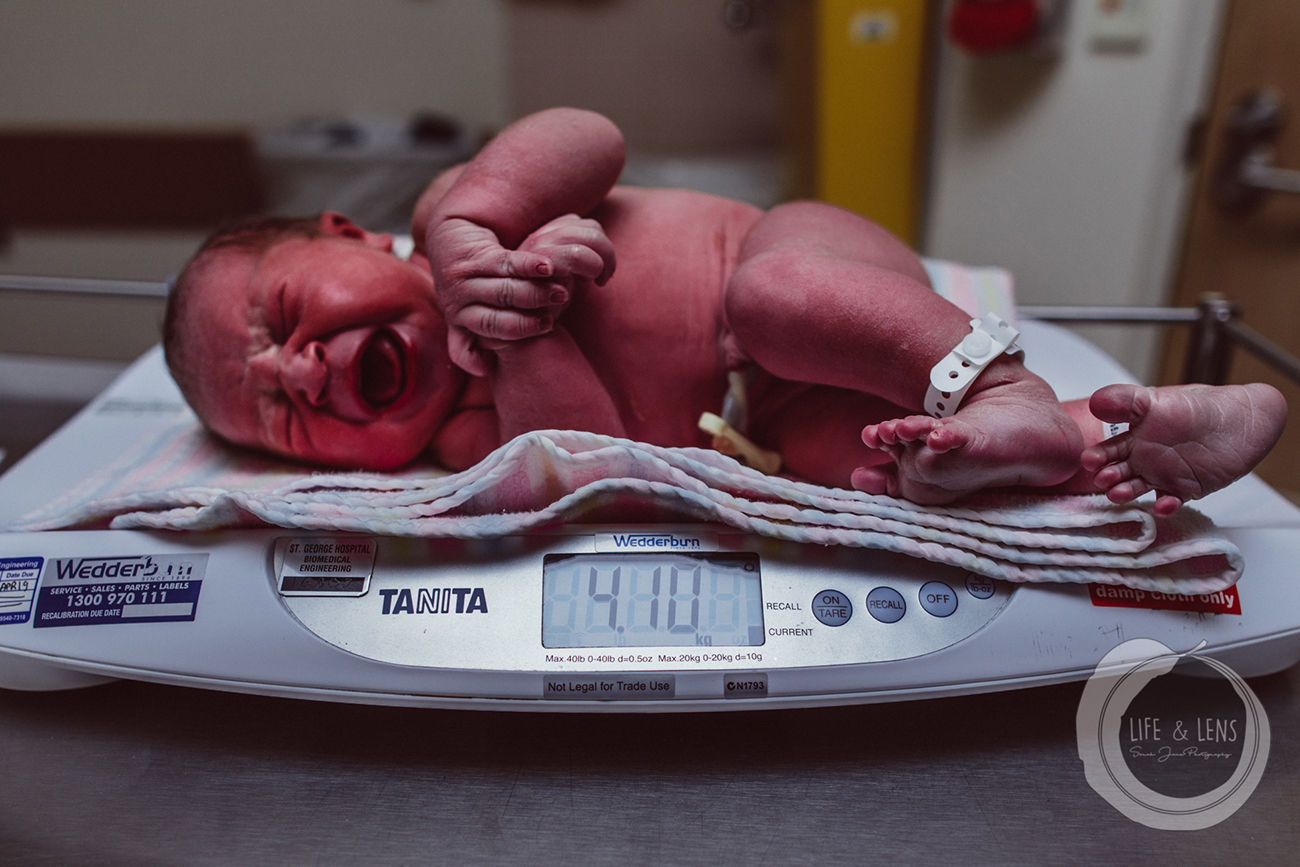Birth Myths - Birth and big babies
“Your baby is too big so we need to:
Induce
Schedule you for a c-section”
Ahem, if I had a dollar….. no really, I’d be rich. This is what I like to call a standard ob “one liner”; it’s right up there with “your pelvis is too small”. Statements like this only serve to instil fear and doubt in pregnant and birthing women, at a time where we should be filling them with confidence and support.
Macrosomia is the medical term for a big baby, in Australia, some places deem a 4.0kg baby as “large” or macrosomic, and others deem 4.5kg babies as macrosomic. If we use the 4.5kg weight as a measurement, only 1.8% of Australian babies are considered macrosomic.
So let’s break this down. The average size of a newborn baby in Australia is 3.4kg. Just in the last month I have seen babies born with weights of 3.4kg, 3.7kg, 3.6kg and 4.1kg giving me an average weight of 3.7kg.
I have seen women have trouble birthing “small” babies and women birth “large” babies with ease and that is the beauty of the human body and of birth, no two babies and no two births are the same. That is why you hear of women being able to birth their 5kg babies at home, with no intervention.
How we create problems in birth by trying to avoid problems…
I recently read an article on a study of macrosomic babies; this study looked at the records of 145 women and their infants and found that the women with suspected macrosomic babies experienced births with more complications than to the women who had unexpected macrosomic babies.
In this study, women with suspected macrosomic babies had a 42% induction rate while women with unexpected macrosomic babies had an induction rate of only 14%.....
Yes, you read right. A huge 28% difference!
The rate of mothers with suspected macrosomic babies who experienced complications was 17% compared to only 4% when a large baby was not expected.
And the clincher right here…
Mothers with suspected large babies had a c-section rate of 52%.....compared with the 17% c-section rate for the mothers who had unexpected large babies….
Why then, does our medical system place such importance on the perceived weight of your unborn baby?
Unfortunately, as with a lot of things in the medical system, it mostly comes down to risk.
Medical professionals and institutions have an ‘acceptable level of risk’ and most in Australia reason that supporting a perfectly healthy woman to naturally birth her “large” 4kg baby as “too risky”.
Too risky for whom? And what do they define as “too risky”?
Are they suggesting a scheduled c-section over a natural vaginal birth because they believe recovery will be faster?
Doubtful; average recovery time for a c-section is well over 6 weeks and most women I know who’ve had c-sections report not feeling ‘back to themselves’ until well over 6 months and some even longer…
Let’s not forget that c-sections are major abdominal surgery. I’d rather try to birth my “large” baby naturally and risk suffering a 1st or 2nd degree tear than opting to have a c-section based on a highly inaccurate “guess” of the weight of my unborn baby…
Are they suggesting you be induced early before your baby grows “even bigger” because the risk of you suffering a 1st, 2nd or 3rd degree tear is lower?
I highly doubt it and if you know a thing or two about how inductions work and the associated risks of ending up with other instrumental deliveries or c-sections then you’d probably agree. I would go so far to say that inductions are more often suggested with the medical provider EXPECTING that you’ll most likely end up in a c-section regardless…
I’ve heard first hand from people who have gone in to be induced, for a litany of reasons, to go on to birth their babies vaginally and then be told afterwards by the midwives and ob’s on staff how shocked they were that they didn’t end up in a c-section; that’s how common it is…
Not only that, more often than not, women who end up being induced have higher chances of requiring episiotomies or forceps deliveries which in turn lead to vaginal trauma anyway so in this scenario, you really have to weigh up the risks of attempting to birth your “large” baby vaginally or going in for an induction.
So what do you do if you find yourself in this situation, having this conversation with your ob…?
Ask questions. Demand proof.
Are they basing their estimation of your baby’s weight off the size of your belly or the measurements from an ultrasound?
Ask them how accurate ultrasounds are at determining your baby’s weight.
Did you know that a third trimester weight prediction can vary from the actual birth weight by 10-15%; meaning an ultrasound could determine your average sized 3.6kg baby as actually weighing 4.14kg which is starting to edge into the “too large” territory in some medical professional’s opinions…
Are they basing their estimation of your baby’s weight off your fundal measurements?
Ask them if the baby’s position, the size of your placenta, the amount of amniotic fluid you have, the size of your torso, the meal you just ate and the amount of water you’ve drunk that day don’t have anything to do with it.
One very important thing to note is that a large fetal weight does not equate to a large fetal head. But, we all assume that right? Because that is what society has taught us…when you hear of a woman birthing an ‘above average’ baby we all think “ouch” and assume that birthing that baby’s head must have been difficult, but it’s not always and is very rarely, the case.
As is a mother’s pelvis being “too small” to safely birth her baby vaginally. Save for women who suffer from pelvic abnormalities, the size of a woman’s pelvis means little as if her body is adequately proportionate, her body will not grow a larger baby than her body can handle birthing; to do so would go against the very grain of evolution and physiology…
My tips!
Trust in yourself!
You have millions of years of genetics on your side, let that bolster you and give you confidence that you can birth your baby naturally and vaginally, regardless of size!Take your baby’s ultrasound weight measurements with a grain of salt…
or better yet, don’t get unnecessary growth ultrasounds…they are merely an estimate and if they are going to put doubts and fears into your mind then why bother? Obviously, if there are known health issues with you and baby, this is different and do what is right and best for you in that scenario…Choose a care provider/hospital with low induction and c-section rates!!!!
I won’t go too far into this as I’ll be writing on this more in depth later but this tip is crucial!Remain upright during labour!
Let gravity help you! A doula friend Samantha Gunn (check her out!) of mine says that bigger babies are easier to birth and there is definite truth to this! Your big baby’s head will push down on your cervix and help you to ripen and dilate, then when it is time, the weight of your baby will help him/her to navigate their journey through the birth canal and out into this beautiful big world.
If you’d like to do some reading on how you can stay active during labour and birth, check out the amazing resource that is the Spinning Babies website; you can thank me later.
The conclusion of the study I referred to above really sums up this discussion nicely:
“Our ability to predict macrosomia is poor. Our management policy of suspected macrosomic pregnancies raises induction of labour and caesarean delivery rates without improving maternal or fetal outcome.”
So in other words, who cares what the ultrasound says in regards to baby’s weight because at the end of the day, it means very little. What matters more is your attitude towards your birth and your trust in your body and your innate ability to birth your baby naturally and safely with minimal complications and interventions.





